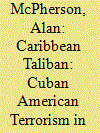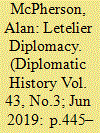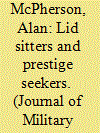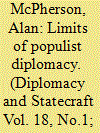|
|
|
Sort Order |
|
|
|
Items / Page
|
|
|
|
|
|
|
| Srl | Item |
| 1 |
ID:
166668


|
|
|
|
|
| Summary/Abstract |
Most scholars have not taken Cuban-American terrorism in the 1970s seriously, despite the unprecedented campaign of terror it unleashed. Borrowing a framework of self-identity usually applied to other terrorist groups and using case studies of the Cuban Nationalism Movement in New Jersey and of Alpha 66 in Florida, this article argues that Cuban-American political ideology was the key to its impact and its support from communities in Florida and New Jersey. Militant exiles saw themselves as betrayed by two enemy states, entitled to rule in their homeland, and imbued with a mission of civilizational renewal. In these ways, Cuban-American terrorists were similar to the Taliban in Afghanistan and their reign of terror in the 1970s should be appreciated as a major episode in the history of U.S. and global terrorism.
|
|
|
|
|
|
|
|
|
|
|
|
|
|
|
|
| 2 |
ID:
165953


|
|
|
|
|
| Summary/Abstract |
On September 21, 1976, a bomb taped to the bottom of the car of Chilean exile and former ambassador and minister Orlando Letelier exploded as he drove into Sheridan Circle in Washington, DC. The Chilean died within minutes. Ronni Moffitt, Letelier’s co-worker and a U.S. citizen, sat in the passenger’s seat and also died. Letelier had been an outspoken opponent of Chilean dictator Augusto Pinochet, whose military junta had overthrown Marxist president Salvador Allende in 1973 and thrown Letelier, then Minister of Defense, in a prison camp for a year without charges. The investigation that followed pointed to the National Intelligence Directorate (DINA), the Chilean secret police, as the culprit, helped by an American-Chilean and a handful of Cuban-Americans; criminal and civil cases to bring the guilty to justice swallowed up the next few decades.
|
|
|
|
|
|
|
|
|
|
|
|
|
|
|
|
| 3 |
ID:
128543


|
|
|
|
|
| Publication |
2014.
|
| Summary/Abstract |
This article argues that U.S. occupations in the Dominican Republic, Nicaragua, and Haiti in the first third of the twentieth century lasted as long as they did for political reasons. U.S. military commanders disagreed with civilians in the State Department partly because of a lack of both policy guidance and interdepartmental coordination. In addition, State grew more sensitive than Navy to negative public opinion both foreign and domestic and to national political strategy. Marines, meanwhile, were more driven to reform the societies they occupied but also less sensitive to their own abuses, to changing norms, and to geopolitical reasons for ending occupations.
|
|
|
|
|
|
|
|
|
|
|
|
|
|
|
|
| 4 |
ID:
076734


|
|
|
|
|
| Publication |
2007.
|
| Summary/Abstract |
This article asks what lessons about diplomacy can be drawn from Fidel Castro's April 1959 trip to the United States and Canada, a trip long neglected by historians as an aberration in US-Cuban relations because of its apparent public relations success. The trip's meaning, rather, lies in the populist style Castro practiced to circumvent normal protocol, and more importantly in the failure of that populism to sway not only US foreign policy makers but also the US public. Based on comprehensive media and archival research and of interviews in Cuba and the United States, this is the first ever article-length treatment of this diplomatic visit. It helps to understand not only the US-Cuba divide that soon followed Castro's trip but also the limited potential of a populist diplomacy.
|
|
|
|
|
|
|
|
|
|
|
|
|
|
|
|
|
|
|
|
|